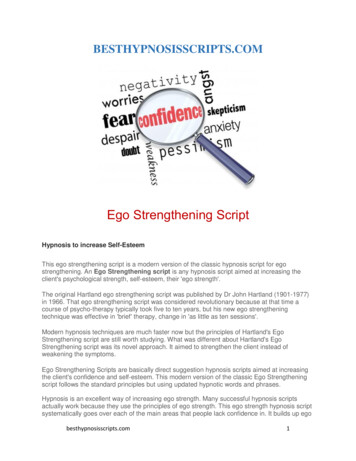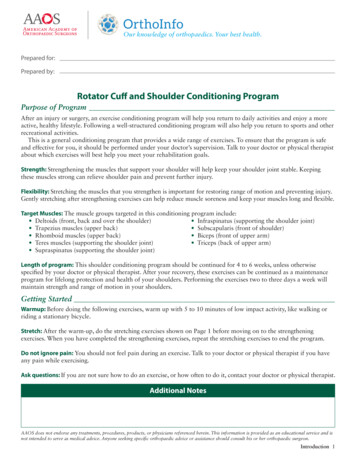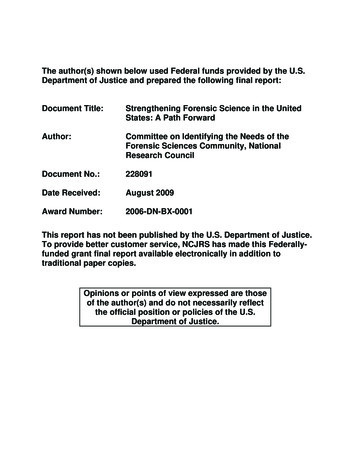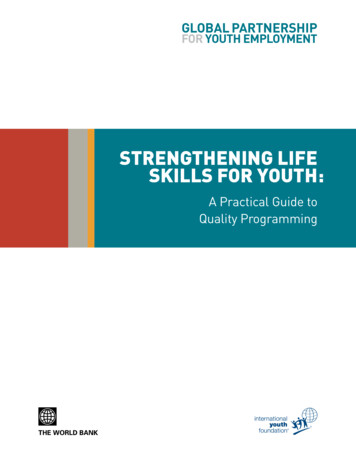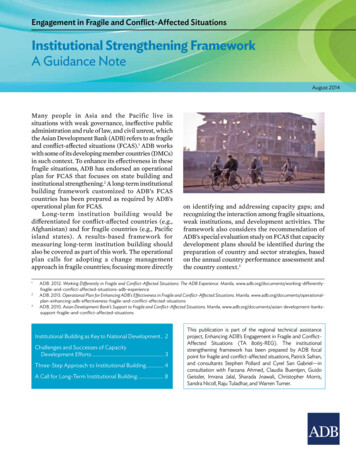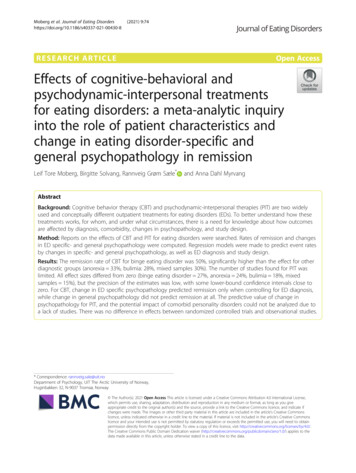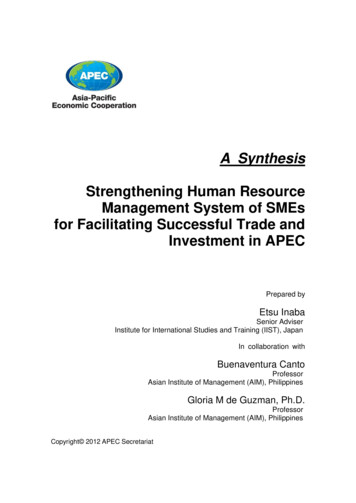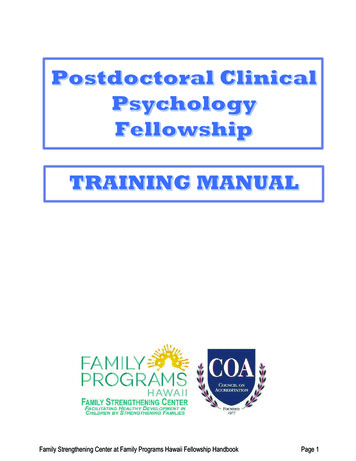
Transcription
Family Strengthening Center at Family Programs Hawaii Fellowship HandbookPage 1
FamilyProgramsHawaiiis a uniquenon-profit agency remaining true to its origins of,'.'\-·.\providing quality care to the children of Hawai'i. OurIgoal is that every child in Hawai'i has the opportunityFAMILVi' ,PROGRAMSto reach his or her full potential - especially childrenwho are in or may become involved in foster care. Family Programs Hawaii supports children andfamilies by providing services to prevent childrenHAWAIIfrom entering foster care, supporting children andfamilies already involved in the foster care system,and assisting youth transitioning out of foster care tosuccessfully prepare for adulthood.As of 2016,Family Programs Hawaii has served over 4,000families and children through its range of servicesand projects.The Hawai'i School of ProfessionalPsychology (HSPP) at ChaminadeThe HSPP encouragespersonalandprofessionalgrowth through faculty mentorship, engaging class s. Its programs develop psychologistswho can work to address the mental health needs oflocal populations in Hawai'i and who understand andrecognize the importance of social justice and humanOne Archer Lane. 801 S King St. Honolulu. HIOffice Telephone: (808) 282-0156 OfficeFax: (808) 521-2000Email: FSC@FamilyProgramsHawaii.orgWebsite: www.familyprogramshawaii.orgDirector: Dr. Steven J. ChoyEmail:schoy@fomilyprogramshawaii.orgCenter fees are paid through grants, slid ing scale fees, and all major health insur ances, including Quest.diversity. The clinical psychology programs preparepractitioner-scholarswhosescientific,In Affiliation with:theoreticaland practical foundations enable them to meet thechallenges of the diverse settings, populations andcommunities in which they serve.providesadvancedgraduateThe FSC at FPHschoolThe FamilyStrengtheningCenterPracticum,Internship and Post-Doctoral training in ClinicalPsychology in affiliation with HSPP.The HSPP atChaminade University's Psy.D. program is accreditedby the American Psychological Association.Center fees are paid through grants, slidingtt\lHO'OM - !1·-Creating PeaceJFV§AJ[! \It\\\ ,\111\R "CIIPCIT Trainers trained by:scale fees, and all major health insurances,including Quest.CHILDREN'S HOSPITALIn affiliation with the Hawaii School ofProfessional Psychology at ChaminadeJl§ S! ttfor children & families in needPSYCHOLOGICAL ASSESSMENTSIMPROVING outcomes for children & familie
Specialty ServicesFamily Strengthening CenterThe Family Strengthening Center at Family Programs Hawaii, inaffiliation with the Hawaii School of Professional Psychologyis a non-profit Community Mental Health Centerthat provides services to culturally, socially, and economicallydiverse children and their families. The mission of theCenter is to promote healthy development of children bystrengthening their families through a multidisci plinaryapproach. This is accomplished in collaboration with manyother organizations and agencies that address thehealthy development of children. Through the Center'smultidisciplinary staff, the Family Strengthening Centerprovides an array of services that address the developmentalneeds of children and assist their families to facilitate healthydevelopment.EVALUATIONS Comprehensive Clinical Psychological Evaluations(Infant, Child, Adolescent, and Adult)Psychological Family Risk EvaluationsDevelopmental Psychological EvaluationsFamily Systems Psychological EvaluationsMental Health AssessmentsChild Parent Relationship AssessmentsAttachment AssessmentsPsychoeducational EvaluationsDevelopmental Disabilities EvaluationForensic Psychological EvaluationsPlacement Psychological EvaluationsEXPERT COURT TESTIMONY& CONSULTATION Best Interest of the ChildAttachment IssuesPlacement Issues for ChildrenPermanency PlacementPsychological DisordersChild Maltreatment Risk Factorsand Impact of Child MaltreatmentVISITATION & TRANSITIONALSERVICES Therapeutic Child-Parent VisitationsReunification Transitional Counseling ServicesTermination of Parental Rights Counseling ServicesFamily Separation and Change of Placement CounselingServicesSUPPORT SERVICES Mentoring Support Services Supportive Services to Prevent Juvenile Incarceration Parenting Support Groups Foster Care Support Groups Support for Youth Aged-Out of Foster CareTREATMENT SERVICES Individual, Couples, Family, and Group Services(Infant, Child, Adolescent, and Adult Psychotherapy) Child Parent Psychotherapy- CPP(Evidence-Based Psychodynamic Trauma Focused Relation ship Treatment) Parent-Child Interaction Therapy- PCIT(Evidence-Based Relationship Treatment Focused onImproving Parent-Child Relationships and Child Emotionaland Behavioral Regulation Challenges) Mental Health Crisis Therapy Services Trauma Focused Cognitive Behavioral Therapy(Evidence-Based Cognitive Behavioral Therapy)TRAINING SERVICES* Practicum, Internship, and Post-Doctoral Fellowship TrainingPrograms in Clinical Psychology with Emphasis in TraumaInformed Care Social Work Practicum/Internship and Clinical Experience inTrauma Informed Care Marriage and Family Therapy Practicum Training in TraumaInformed Care Health Professionals Practicum Training in Trauma InformedCare Community Trauma Informed Care Workshops Vicarious Trauma, Compassion Fatigue, and Self-Care Training Parent-Child Interaction Therapy Training Center Child Parent Psychotherapy Training/Supervision Psychoeducational Parenting Training Child Development/Attachment Training Child Maltreatment, Interpersonal Violence, and TraumaTraining Co-Sponsor of the Annual Hawai'i International Summit onPreventing, Assessing, and Treating Trauma across theLifespanRESEARCH* Family Based Program Evaluation Family Related Research Interpersonal Trauma Related Research Child Development Research Evidence-Based Evaluation and Treatment Research Cultural and Individual Diversity ResearchTrauma Informed CareAll of our assessment and treatment services are TraurrInformed.Trauma-Informed Care is a strengths-baseframework grounded in an understanding of and responsiveneito the impact of trauma, that emphasizes physicapsychological, and emotional safety for everyone, and th,creates opportunities for survivors to rebuild a sense of contrcand empowerment.Parent-Child Interaction Therapy (PCIT)PCIT is an Evidence-Based relationship treatment progrardeveloped to treat families with children ages 2-8 who exhibbehavioral problems that are interfering with the child's healthdevelopment.The treatment is designed to improvparent-child relationships and address children's emotional anbehavioral regulation challenges. PCIT helps parents managtheir child's behaviors more effectively through building a warrand responsive relationship with their child. Research hashown that strengthening parent-child interactions results iimproved child and family functioning. The Family ProgramHawai'i Family Strengthening Center serves as a PCIT TraininCenter for Hawai'i.Group TherapyGroup therapy reduces the psychological trauma childreexperience from abuse, neglect, and separation frorparents. This program helps to develop a child's psychologic,strengths in order to facilitate healthy development. Thesservices are provided to children who have entered the chil,welfare system and have been temporarily placed at thHo'omalu O Na Kamalii shelter. The shelter keeps children safuntil they can be reunified with their parents or placed witappropriate kin or culturally similar resource caregivers in theicommunity.*Research and Training in collaboration with the Hawai'i Schoolof Professional Psychology and the Family Violence & SexualAssault Institute. Psychological services directed and supervisedby a National Register Credentialed Health Service Psychologist.
Table of ContentsChapter 1: Family Strengthening Center & Post-Doctoral Fellowship Program-OverviewPost-Doctoral Fellowship Program Overview . . .Family Programs Hawaii Mission Statement . FSC and Post-Doctoral Fellowship Program Background and Philosophy .Post-Doctoral Fellowship Program’s Requirements and Responsibilities Post-Doctoral Fellowship Program Ethical & Professional Obligations Post-Doctoral Fellowship Program Structure . . 334456Chapter 2: Post-Doctoral Psychology Fellowship Training ProgramFellowship Program Activities and Purpose Post-Doctoral Fellowship Program’s Goals and Objectives . .Overview of Training .Program Administration and Faculty Supervision and Didactic Training Selection of Post-Doctoral Fellows . .Research Activities .Post-Doctoral Fellows Stipends/Training Salary .77101011111112Chapter 3: Post-Doctoral Fellows Rights and ResponsibilitiesOverview . 12Fellow Rights . 12Fellow Responsibilities . 12Source of Evaluation . 13Outside Work . 13Nondiscrimination Policy . 14Chapter 4: Identification of Problem Behavior and Due ProcessDefinition of Problem Behavior and Due Process Procedures .16APPENDICESAppendix A Fellows Memorandum of Understanding . 21Appendix B Post-Doctoral Fellowship Application Guidelines . 25Appendix C Post-Doctoral Fellowship Training Report . 26Appendix D Verification of Post-Doctoral Fellowship Completion . 35Appendix E Verification of the Receipt for the Post-Doctoral Fellowship Manual . 36Appendix F Required Documents for the Completion of Post-Doctoral Fellowship . 37Appendix G Post-Doctoral Fellow’s Program and Supervisor Evaluation. 38Family Strengthening Center at Family Programs Hawaii Fellowship HandbookPage 2
CHAPTER 1: 2019 to 2020 Family Strengthening Center at Family Programs Hawaii-OverviewMission StatementThe Post-Doctoral Fellowship program at the Family Strengthening Center at Family Programs Hawaii (FSC)endorses the Family Strengthening Center’s mission statement. Our mission to facilitate healthy developmentin children by strengthening families. The FSC is a training center that develops professional competence,provide opportunity for clinical, scientific and personal growth, and foster interpersonal effectiveness.Our affiliation with the Hawaii School of Professional Psychology (HSPP) at Chaminade University of Honolulualso gives us the opportunity to work with the University to instill the knowledge, skills, and ethical values ofprofessional practice, and to foster values of social responsibility in a supportive learner-centered environmentof mutual respect and professional excellence.Family Strengthening Center & Internship Program Background and Philosophy OverviewThe services that FSC provides are part of the long history of psychological services provided through theKapi’olani Child Protection Center at the Kapi’olani Medical Center for Women and Children. The Kapi’olaniChild Protection Center, an APPIC Post-Doctoral Psychology Residency member, was founded in 1987 by itsDirector, Steven J. Choy, Ph.D. The Center continued to provide psychological services as part of aMultidisciplinary Team that provided services to victims of child maltreatment and their families. Thepsychological services at the Kapi’olani Child Protection Center were eventually transferred to the HawaiiSchool of Professional Psychology at Argosy University in 2012 as part of its APPIC Doctoral Internship FSC.In 2014, the Family Strengthening Center at Family Programs Hawaii was founded and continued to be a siteunder the HSPP Doctoral Internship Consortium. The FSC continued to be a site in the HSPP DoctoralInternship Consortium until March of 2019, when Argosy University closed. Since that time, the FSC continuedas an Individual Doctoral Internship and Post-Doctoral Fellowship site following all of the requirements of anAPPIC member Doctoral Internship and Post-Doctoral Fellowship, and participated in the Doctoral Internshipand Post-Doctoral Fellowship Match as an APPIC member.The FSC Post-Doctoral Fellowship program offers a comprehensive Post-Doctoral Fellowship-training programin professional psychology and is designed to fulfill the clinical Post-Doctoral Fellowship requirements forHawaii state and other state licensure requirements in clinical psychology. Because the FSC Director was theTraining Director of the APPIC member HSPP Doctoral Internship Consortium, the FSC continued to follow allof the requirements of an Individual Doctoral Internship and Post-Doctoral Fellowship site and is applying formembership as a separate independent site. The FSC as part of the HSPP Doctoral Internship Consortiummatched with and accepted 3 Doctoral Intern students for the 2018 to 2019 Doctoral Internship year andcontinued to provide APPIC Affiliated supervised clinical psychology Doctoral Internship Training after the closureof Argosy University to complete the current Doctoral Interns’ training. The FSC entered the 2020-2021 PostDoctoral Fellowship through the Universal Application system as an-APPIC member.The Family Strengthening Center at Family Programs Hawaii specializes in working with vulnerable andculturally and individually diverse populations and grounded in Trauma Informed Care and a variety of EvidencedBased Treatment. Under Family Programs Hawaii, a non-profit social agency, the FSC is fully accredited bythe Counsel on Accreditation (website: www.coanet.org). The FSC serves as the training site for Parent-ChildInteraction Therapy for the State of Hawaii, and have trained therapists in the evidenced based Child ParentPsychotherapy. The FSC, as a Community Mental Health Center, also serves as the State of Hawaii PsychologicalConsultant on Child Maltreatment issues and provides Statewide Comprehensive Psychological evaluations for theChild Welfare Services Section (Child Protective Services) of the Department of Human Services. Furthermore, theFSC is the Mental Health Consultants for the State of Hawaii Specialty Courts and our Doctoral Interns and PostDoctoral Fellows participate in the courts as a member of the court team. The FSC has over 40 years of psychologicalFamily Strengthening Center at Family Programs Hawaii Fellowship HandbookPage 3
experience in the assessment, treatment and prevention of child maltreatment. The psychological staff has alsoprovided expert court testimony on child maltreatment. Due to the expertise in Child Maltreatment, the FSC hasattracted many students interested in psychological training in Trauma Informed Care.The Family Strengthening Center is supported by several long-term and renewable large State of Hawaii Purchaseof Services grants. Most of the grants provide state-wide services. The FSC also receives grants and donations fromseveral private community foundations and is a credentialed service provider for most of the private and governmentfee-for-service insurance plans. Private payments are also accepted based on an income-based fee-for-servicessliding scale. The FSC is also supported by training fees for professional training workshops. This allows us to providean annual Training Salary (Stipends) of 36,000 with full benefits to include Medical/Dental/Drug/Vision plan, twoweeks of Paid Time Off and 13 observed and paid holidays.Post-Doctoral Fellowship Program’s Requirements and ResponsibilitiesPost-Doctoral Fellowship Program’s Requirements and Responsibilities:1. The FSC is an APPIC member as an Individual site after Argosy University Doctoral Internship Consortiumclosed. The FSC Doctoral Internship program participated in the 2018- 2019 and the 2019-2020 APPIDoctoral Internship match as a non-APPIC member and participate in the internship match as an APPICmember for the 2020-2021 year. The FSC abides by all of the APPIC membership requirements andresponsibilities to be accept to the Match as an APPIC member. The FSC Doctoral Internship programsreceived a grant from APPIC to assist in applying for APA accreditation and submitted its self-study forreview by APA in June 2021.2. The FSC Post-Doctoral Fellowship program is managed by the Post-Doctoral Fellowship Training Director,Dr. Cheryl Andaya, who is a Licensed Clinical Psychologist, and Dr. Steven Choy, the FSC’s Executiveand Clinical Director. Dr. Andaya is full-time at the Center, which includes her teaching responsibilities asan Adjunct Professor at the Hawaii School of Professional Psychology at Chaminade University ofHonolulu. The Post-Doctoral Fellowship Training Directors also are responsible for the coordination oftraining and networking with each of the Post-Doctoral Fellows academic program.3. In addition to the Post-Doctoral Fellowship Program, the FSC is a doctoral practicum site for graduatepsychology Universities/Schools as well as a training site for Doctoral Psychology Interns. This allows thePost-Doctoral Fellows to have experiences with trainees from different Graduate schools and allow themto receive training and experience in supervision of the Doctoral Psychology Practicum trainee. They havejoint training experiences with the FSC’s Doctoral Psychology Interns.4. The FSC has 5 Licensed Clinical Psychologists on staff who work onsite as primary and secondarysupervisors of the Post-Doctoral Fellows. There are four 1.0 FTE equivalent Clinical Psychologists, andone .50 FTE Clinical Psychologist (.25 FTE is devoted to supervision of the psychology trainees). The Post-DoctoralFellows have daily access to a Licensed Clinical Psychologist and have experience with at least two different clinicalsupervisors during their Post-Doctoral Fellowship training.5. The Training Directors and all of the Licensed Clinical Psychologist Faculty/Staff comprise the trainingfaculty/committee and are responsible for the integrity and quality of training. This Training Committee a)directs and organizes the training program and its resources at that site, b) is involved in the selection ofPost-Doctoral Fellows, c) monitors and evaluates the training program’s goals and activities at that site, d)is responsible for documenting and maintaining the Post-Doctoral Fellows’ training records, and e)participates in weekly group supervisors and training faculty meetings.6. The FSC provides at least two hours per week of face-to-face individual supervision, and two hours perweek of group supervision for each full-time Post-Doctoral Fellow by a Licensed Clinical Psychologist. TheTraining Faculty is responsible for the development and presentation of the training activities and also usesguest faculty/trainers in the community to provide training in special areas of their expertise. An averageof 2 to 4 hours of didactic training is provide through the FSC’s weekly Training Seminars.Family Strengthening Center at Family Programs Hawaii Fellowship HandbookPage 4
7. The Post-Doctoral Fellow will be assigned a specialized family court group (i.e., Family Drug Court, GirlsCourt, Juvenile Drug Court, Zero-to-Three Court) to manage their mental health services. The PostDoctoral Fellow will be responsible for provide psychological consultation, receive PsychologicalEvaluation request and provide Intervention consultation to the Specialty Court as part of the Court Team.8. Each Fellow is guaranteed an annual Training Salary (Stipends) of 36,000 with full Medical/Dental/Drug/Visionplan and two weeks of Paid Time Off with 13 observed and paid holidays. The average annual Post-DoctoralFellowship training stipend in Hawaii is 35,000.Post-Doctoral Fellow Requirements and Responsibilities:1. The Post-Doctoral Fellowship is a year-long (365 days), full-time, 2000-hour training experience. PostDoctoral Fellows and sites may adjust their schedules to meet the needs and training experience of both,but it is expected that Post-Doctoral Fellows will accumulate their hours based on a 40-hour week for aminimum of 50 weeks. Overtime and/or compensation time will not be grounds for leaving a Post-DoctoralFellowship in less than 52 weeks. Post-Doctoral Fellows who do not document 2000 hours during thetraining year may petition the FSC to continue training with the FSC until those hours are completed.2. Post-Doctoral Fellows must provide a minimum of 500 hours of direct client contact or approximately onequarter of their time. This ranges from 10-15 and no more than 20 hours per week of direct client contact.The rest of the time should be spent with training experiences, supervision, report writing, caseconferences, meetings, research, etc.3. Post-Doctoral Fellows must attend weekly group supervision and training seminars at the FamilyStrengthening Center at Family Programs Hawaii.4. Post-Doctoral Fellows must complete one research project that will be submitted for peer review andpossible acceptance for a paper/poster presentation at the Annual Hawaii Trauma Conference and/or anyapproved conference/convention.5. Post-Doctoral Fellows must participate in a group community service activity related to the field of clinicalpsychology with all of the Doctoral Interns and the Post-Doctoral Fellows at the FSC.6. The Post-Doctoral Fellowship year begins on September 1 and ends on August 31. Provisions can bemade for Post-Doctoral Fellows who need to extend their training beyond August 31 for unforeseenreasons in order to secure at least 2,000 hours of Post-Doctoral Fellowship training. Post-Doctoral Fellowsare covered by liability/malpractice insurance through the Family Strengthening Center at FamilyPrograms Hawaii and their academic program for one year beginning September 1 and ends at the endof the Fellow’s Post-Doctoral Fellowship.Post-Doctoral Fellowship Program Ethical & Professional ObligationsAs a Post-Doctoral Fellowship Training Program, it is the ethical and professional responsibility of the FSCfaculty, supervisors and administrating staff to ensure, to the best of their ability, that the Post-Doctoral Fellowswho complete their training programs are competent enough to carry out their professional responsibilities inan effective and appropriate manner. It is the training staff’s obligation, not only to evaluate their Fellow’scompetence in relevant program requirements, but also to evaluate other competence areas related to fitnessfor practice. This includes, but is not limited to, professional characteristics such as: (a) interpersonal skills; (b)self-awareness, self-reflection and self-evaluation; (c) emotional maturity, stability and well-being; and (d)ability to resolve issues that interfere with professional and skill development. Supervisors of Post-DoctoralFellows should not strive to advance, recommend or graduate Post-Doctoral Fellows who have cognitive,Family Strengthening Center at Family Programs Hawaii Fellowship HandbookPage 5
emotional, psychological, interpersonal, technical or ethical difficulties that may have a negative impact on theprofession, future sites or the general public. Rather it is the responsibility of the training staff to address anydeficiencies through training activities, supervision, and appropriate remediation efforts. Documentation ofeach Fellow’s progress and challenges is expected.Post-Doctoral Fellowship Program StructureThe Post-Doctoral Fellowship Program is administratively coordinated by Drs. Steven J. Choy, and Cheryl K.C.Andaya. Dr. Choy is the Executive and Clinical Director of the Family Strengthening Center, is a NationalRegister Credentialed Health Service Psychologist and Hawaii Licensed Clinical Psychologist. He is also anAffiliated Professor at Hawaii School of Professional Psychology at Chaminade University. Dr. Choy has beenlicensed in the state of Hawai‘i since 1977.Dr. Andaya is the Assistant Director of the Family Strengthening Center, is a National Register CredentialedHealth Service Psychologist and Hawaii Licensed Clinical Psychologist. She is also an Adjunct Professor atHawaii School of Professional Psychology at Chaminade University. Dr. Andaya has been licensed in the stateof Hawai‘i since 2007.The Post-Doctoral Fellowship Program Directors (FPD) are administratively responsible for the overallfunctioning, selection, supervision and training of Post-Doctoral Fellows. The FPDs’ responsibilities includedevelopment of the training program, coordinating selection of Post-Doctoral Fellows, communications withAPPIC (if approved for APPIC membership), facilitating the flow of information to all of the Fellow supervisors,ongoing review of the training goals and objectives, and overseeing the documentation and maintenance ofPost-Doctoral Fellows’ training records. The FPDs provides leadership thereby assuring scheduledsupervision and arranging for Fellow participation in the training seminars and weekly group supervision.Specifically, the FPDs’ responsibilities include:1. Organizing the weekly didactic and supervision training seminars: The FPDs arrange for weekly didacticand supervision training seminars for all of the Post-Doctoral Fellows. The FPDs oversee the trainingseminars and are responsible for appointing a licensed clinical psychologist(s) and guest faculty/trainersto implement them. The FPDs and the Post-Doctoral Fellowship Training Committee identifies trainingcomponents and didactic content that is included in formal presentations throughout the course of thePost-Doctoral Fellowship year. These training seminars may involve presentations by members of thetraining staff and/or presenters invited from the community that are experts in their field. The FPDs anddesignated seminar leader(s) attend to scheduling, invitations, and evaluations of the presentations.Budgetary issues and honoraria for outside speakers is the responsibility of the FPDs, and the ExecutiveDirector of the FSC.2. Communications with APPIC: Annual information updates, registration with the Association of PsychologyPostdoctoral and Doctoral Internship Centers (APPIC), three-year reviews, and other necessarycommunications with APPIC are the responsibility of the FPDs.3. Supervision and Training: The FPDs is responsible for the administrative component of supervision (i.e.assuring that Post-Doctoral Fellows are receiving adequate supervision by their supervising ClinicalPsychologist and for coordinating the Performance Evaluation of the Post-Doctoral Fellows).4. Program Evaluation: Evaluations are conducted twice during the training year. Evaluations undertaken bythe Post-Doctoral Fellowship Training Committee to assure that students, supervisory staff, andparticipating community agencies and State for Hawaii Departments receive input in identifying concerns,providing positive feedback for participating staff and students, and assuring the quality of training. TheFamily Strengthening Center at Family Programs Hawaii Fellowship HandbookPage 6
FPDs oversees evaluation and helps communicate feedback to individuals and participatingagencies/department. The FPD also identifies areas for the improvement of the FSC Post-DoctoralFellowship Training Program.5. Post-Doctoral Fellows Selections: Coordination of the APPIC Post-Doctoral Fellowship matching period.Family Strengthening Center at Family Programs Hawaii Fellowship HandbookPage 7
CHAPTER 2: POST-DOCTORAL PSYCHOLOGY DOCTORAL FELLOWSHIP TRAINING PROGRAMFellowship Program Activities and PurposeThe FSC offers a comprehensive APPIC Post-Doctoral Fellowship training program in professionalpsychology. The training program is designed to fulfill the clinical Post-Doctoral Fellowship requirements forHawaii and other state licensure in clinical psychology. The objective of the program is to provide a challengingand supportive training environment to prepare Post-Doctoral Fellows to function as skilled, ethical, culturallysensitive, knowledgeable and competent professional psychologists. A number of experienced role modelsassist the Fellow to augment their current level of knowledge and practice skills. The Fellow is encouraged toexplore diverse theoretical orientations and to experience a wide variety of intervention approaches. PostDoctoral Fellows are treated as respected psychologists-in-training and are supported in functioning asindependent and responsible clinicians.There are four main area of training for the Post-Doctoral Fellows. 1) The FSC has a forensic psychologicalevaluation program for victims of child maltreatment and their family. Each Post-Doctoral Fellow will participatein the forensic evaluations in this program. They will also provide infant development assessment,Developmental Disabilities assessments and individual assessment to determine the psychological needs oftoddlers, children, adolescent and adults.2) The FSC is also a Training and Service Center for Parent-Child Interaction Therapy and our Post-DoctoralFellows will participate in the comprehensive PCIT training and will have PCIT family cases assigned to them.The Post-Doctoral Fellows also participate in our intervention program, which provide individual psychotherapyservices to toddlers, children, adolescents and adults; Family and Marital Therapy; Trauma Focused therapyand dynamic play therapy including Child Parent Psychotherapy and sand play therapy.3) The FSC is the Mental Health Consultant for the Family Court S
Family Programs Hawaii is a unique . Internship and Post-Doctoral training in Clinical Psychology in affiliation with HSPP. The HSPP at . School of Professional Psychology at Argosy University in 2012 as part of its APPIC Doctoral Internship FSC. In 2014, the Family Strengthening Center at Family Programs Hawaii was founded and continued to .
